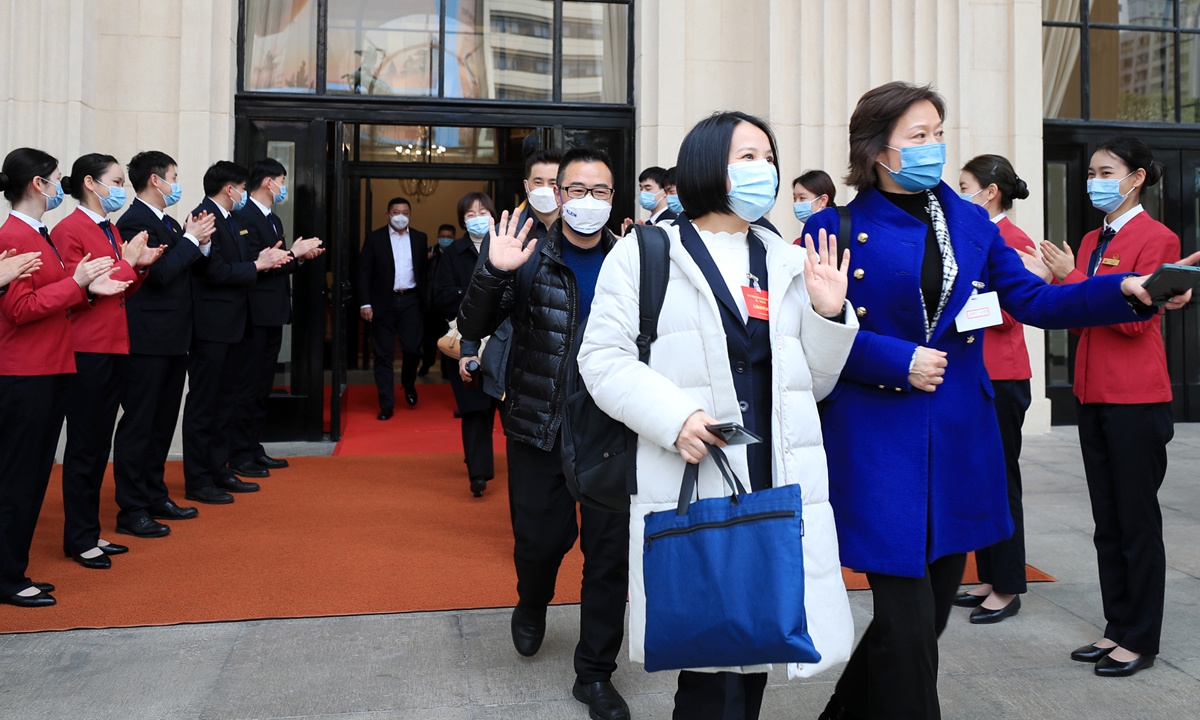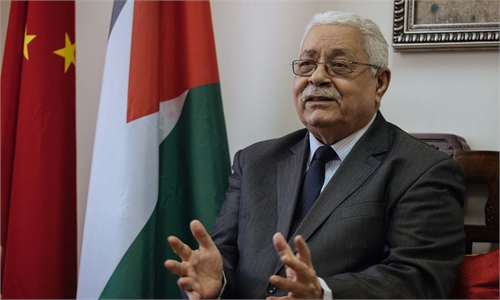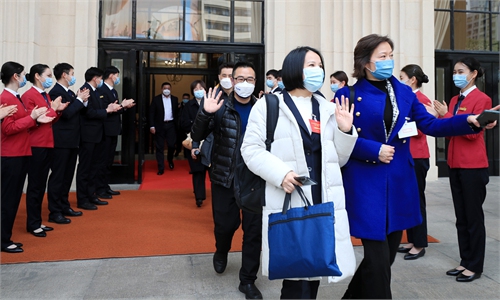
Deputies to the 14th National People's Congress (NPC), China's top legislature, depart for Beijing on March 3, 2023, as the first session of the 14th NPC is about to open in China's capital on March 5. Photo: IC
Editor's Note:The two sessions, one of China's most important annual political events, is an important window for the outside world to understand China's development achievements, plans, governance philosophy, diplomatic concepts and global initiatives. Through this window, international observers closely watch China's moves and recognize China's development and achievements. The Global Times selected the opinions of diplomats and scholars on their expectations toward the two sessions and their understanding of China.
Danilo Türk, former president of Slovenia
There are two types of expectations. The first is related to the short-term, and immediate tasks. Obviously, this is the early post-pandemic situation, and it could be very important to see how China plans its recovery from the COVID situation.
Now, we have already seen a fairly positive assessment from the International Monetary Fund, which projects China's economy will grow by 5.2 percent this year. This is much higher than any other part of the world. That is very good. But it will be important to see what measures the Chinese government will take to stimulate growth and to shape development in ways which will also enhance international cooperation with China.
The second aspect is more of a long-term nature. Because two sessions this year comes after the 20th National Congress of the Communist Party of China, which was held late last year, obviously, there were some important strategic directions defined at the congress. The one I think is particularly interesting is the concept of common prosperity for all.
Mario Cavolo, a senior fellow of the Center for China & Globalization
My expectations for the two sessions remain positive as ever. I see China as the largest safe, stable, successful, capable, civil and peaceful country on the planet. I don't say that lightly. There are evidently observable circumstances and facts, which make it very easy to validate that statement. And the root of what China is capable of doing is its series of five-year plans, which is going continue to develop.
Fariz Mehdawi, Palestinian ambassador to China
In China, what we are talking about here is a different political system. The political system in China is based on the satisfaction of the population at large. It's based on the legitimacy of the people. During the last decade, any fair observer would say that all Chinese are happy about what's happening in their country and they're optimistic about the future. That's really a sign of approval that gives the legitimacy of the system itself and the institution which they are governing.
After living here in this country for six years, I've been following what's going on in the countryside when I do travelling inside china. They would say we are not happy about this or we are happy about that. It's very dynamic, a kind of interaction democracy, which reaches up to the top level of leadership. So every year, whenever the two sessions are held, those policies would take into consideration the feedback which is coming from these masses. This is quite an experience which doesn't look like in another place.
John Pang, a former Malaysian government official and a senior research fellow at Perak Academy, Malaysia
COVID was an acid test of government commitment to the welfare of the people all over the world. The pandemic mercilessly revealed the actual priorities and capacities of governments all over the world. We learned the importance of social cohesion and trust and government capacity to address emergencies. People-centered development works because it's rooted in reality, not political display. It attends practically to what needs to be done.
Deborah Veneziale, an American journalist and a research fellow with Tricontinental: Institute for Social Research
There is a very emotional side to China's people's democracy, putting people first not only in the grand scheme of things, but also in the relationships between people, how respectful people are of others and their surroundings. When there is a people's democracy, as evidenced by the way in which the Communist Party of China has established China's true representative government, there is a different feeling that permeates society.
As the Chinese governance structure becomes more inclusive, as the economic, political, and social levels of the people are elevated, the people's participation becomes greater and the people's democracy becomes stronger.
Xulio Ríos, emeritus advisor of the Observatory of Chinese Politics, a study and analysis working group in Spain
Stability is key to progress in development. This is true for any country, but even more so for China because of its specificity. In this context, it should be pointed out that, first and foremost, democracy must be comprehensive - not only political but also social, economic, and cultural. Progress must be made on all these fronts.
Qaiser Nawab, an international expert on the Belt and Road Initiative (BRI) currently serving at the Islamabad-based Commission on Science and Technology for Sustainable Development in the South
Building "a human community with a shared future" is one of China's top aims, and widening its social network is a component of that. China's circle of friends is growing for several reasons, including its economic growth and increasing global influence, its commitment to multilateralism and win-win cooperation, and its leadership in addressing global challenges.
Firstly, China's economy has been growing rapidly over the past several decades, making it an increasingly attractive partner for countries around the world. Secondly, China has been playing an increasingly important role in international affairs and has demonstrated its commitment to multilateralism and win-win cooperation. Through initiatives such as the BRI and its participation in international organizations, China has shown a willingness to work with other countries to promote peace, stability, and prosperity. Finally, China's leadership in addressing global challenges, such as climate change, poverty, and inequality, has won it friends and supporters around the world.
Nabil Fahmy, former foreign minister of Egypt and visiting senior fellow at the Institute for Global Cooperation and Understanding at Peking University
I think what's interesting in the Chinese approach, be that in the development or the security component: the focus on shared interests, the focus on mutual respect, and the focus on comprehensive, sustained solutions. These are concepts that are very consistent with and adopted by countries like mine and by the non-aligned and developing worlds.
But it is important for China to talk a little bit more about these initiatives, explain them in more details, and do so in different regional environments that allow for a constructive response to concerns raised by others.


